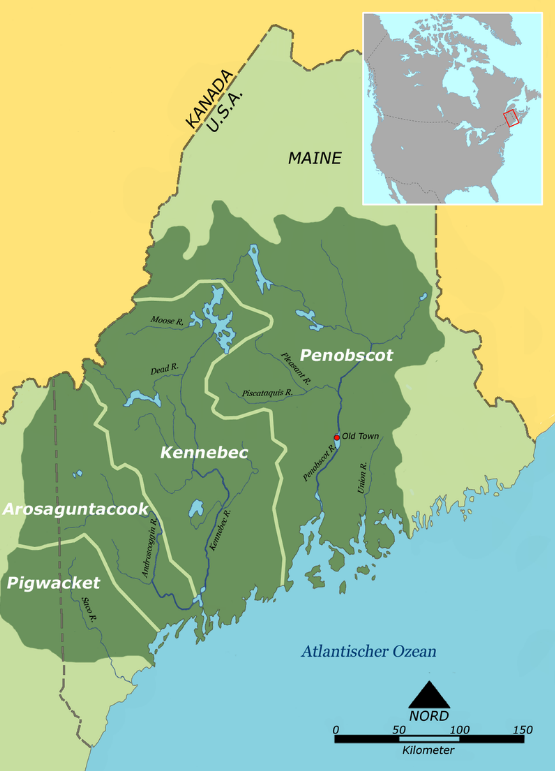Durham Friends Meeting sits on land that is a homeland for the Wabanaki for centuries. Nearly all of us who regularly worship at Durham Friends live and work and play in this Wabanaki homeland.
We are in the homeland of the Wabanaki, the People of the Dawn. We extend our respect and gratitude to the many Indigenous people and their ancestors whose rich histories and vibrant communities include the Abenaki, Maliseet, Micmac, Passamaquoddy, and Penobscot Nations and all of the Native communities who have lived here for thousands of generations in what is known today as Maine, New England, and the Canadian Maritimes. We make this acknowledgement aware of continual violations of water, territorial rights, and sacred sites in the Wabanaki homeland. [from the Abbe Museum website]
At its 2021 Annual Session, New England Yearly Meeting approved an Apology to Native Americans. More resources from New England Yearly Meeting for considering the draft Apology are here.
Below are some resources for better understanding of the Wabanaki people.
Doug Bennett, We Worship On Land That is a Homeland for the Wabanaki, Message given at Durham Friends Meeting, January 17, 2021
The Wabanakis of Maine and the Maritimes: A Resource Book by and About Penobscot, Passamaquoddy, Maliseet, Micmac and Abenaki Indians, Prepared and Published by the Wabanaki Program of the American Friends Service Committee (AFSC, 1989).
Wayne A. Newell (ed.), Kuhkomossonuk Akonutomuwinokot: Stories Our Grandmothers Told Us (Resolute Bear Press, 2021). Reviewed in Friends Journal
Doug Bennett, Beginning to Learn About the Abenaki,” video lecture, Midcoast Senior College, January 2024
Resources at the Abbe Museum Educator Hub
Holding Up the Sky – Maine Historical Society Exhibit via Maine Memory Network
Arthur Spiess, Maine Native Americans: An Archaeological Perspective Covering 13,000 years of Native American History in Maine, Maine State Bicenennial Lecture Series, September 15, 2019
Bruce Bourque and Fred Koerber, 17th Century Native and European Contact, Maine State Bicentennial Lecture Series, July 6, 2021
Wabanaki Collection – University of New Brunswick’s Mi’kmaq-Wolastoqey Centre.
Native Americans and the Amascongan and European Exploration and Native American Contact, Bethel Historical Society
The 2020 Annual Meeting of the Brunswick Topsham Land Trust featured presentations by Joseph Hall (a Bates College professor) and Kerry Hardy (author of Notes on a Lost Flute).
Films:
- Dawnland
- Blood Memory
- The Penobscot: Ancestral River, Contested Territory
- Nebi: The Abenaki Way of Knowing Water
Books:
- Jody Bachelder, Here First: Samoset and the Wawenock of Pemaquid, Maine (DownEast Books, 2022)
- Bruce Bourque, Twelve Thousand Years: American Indians in Maine (2004)
- Lisa Brooks, Our Beloved Kin (2018) and The Common Pot (2008)
- Colin Calloway, The Abenaki (1991)
- Shirley Hager and Mawopiyane, The Gatherings, Re-Imagining Indigeneous-Settler Relations (2021)
- Kerry Hardy, Notes on a Lost Flute (2009)
- Jeanne Morningstar Kent, The Visual Language of Wabanaki Art (2014)
- Robin Wall Kimmerer, Braiding Sweetgrass (2015)
- Barry Lopez, The Rediscovery of North America (1992)
- Henry Lorne Masta, Abenaki Indian Legends, Grammar and Place Names (2014)
- Alice Mead, Giants of The Dawnland: Ancient Wabanaki Tales (2010)
- Jean O’Brien, Firsting and Lasting: Writing Indians Out of Existence in New England (2010)
- Frederick Matthew Wiseman, The Dawn: An Autohistory of the Abenaki People (2001)
- Wheeler, History of Brunswick, Topsham and Harpswell (1878), chapter 1, “Aboriginal Inhabitants”
- Colin Woodward, Unsettled (2014)

